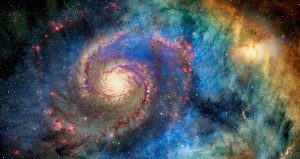Meet our guest panelists.
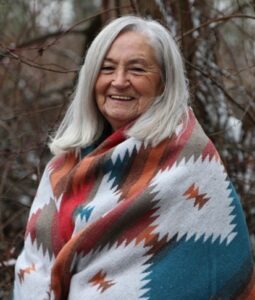
Elder Katherine Knott is Crane or Shuggi, Jijakk clan of the Curve Lake First Nation, part of the great Mississauga Nation. Kathy has participated with McMaster as part of the Elder in Residence program for 7 years now and is grateful for the opportunities to share and learn with the students, staff and academics as we move along our life’s path. She currently volunteers on two committees in her home community and loves spending time there with family and friends relaxing in the Kawartha Lakes Region. She has worked in various levels of management within corporate and government settings and has had the pleasure to work with a number of First Nations both within the province of Ontario and Nationally
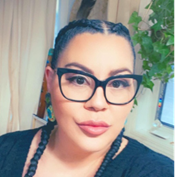
Working on finishing a Bachelor of Arts in Native Studies from the University of Alberta’s Faculty of Native Studies, Bonita Marie Bohnet is a Métis student and scholar from the Northwest Territories with a passion for Indigenous science and astronomy. Her research and work aim to explore the relationships between Indigenous communities, their traditional knowledge systems, and the celestial bodies they observe. By engaging with Indigenous knowledge holders and utilizing interdisciplinary research methods, Bohnet seeks to document, preserve and share the rich cultural heritage of Indigenous astronomy, while also contributing to the broader fields of astronomy and science. Research Assistant to Astronomer Dr. Robert Cockcroft, Assistant Professor in the Department of Physics and Astronomy, and Director of the William J. McCallion Planetarium at McMaster University, Bohnet has contributed research to the development of a new Indigenous Astronomy course being delivered at McMaster University in the fall of 2023. Bohnet will also be facilitating an introductory Indigenous Astronomy course seminar at McMaster University in the fall term, a which she designed encompassing the star lore, sky culture, and Indigenous scientific knowledge of the north. Currently, she is producing a new planetarium show on northern Indigenous astronomy and science for the William J. McCallion Planetarium, which will premier this fall. Bohnet views this work as crucial for preserving Indigenous knowledges and promoting cross-cultural collaboration in the scientific community. Bohnet also contributes to the preservation and cultural continuance of Indigenous astronomical star knowledge through classroom education. The goal of Indigenous Astronomy is to deepen students’ understanding of Indigenous peoples’ unique perspectives on the universe, and their profound contributions to the scientific understanding of the cosmos. This is achieved through presentations that include storytelling and sky lore from several different Indigenous groups along with demonstrations of how they are represented in the stars utilizing free planetarium software that can be downloaded and used by everyone. Students learn how Indigenous peoples used celestial objects for wayfinding, time reckoning and measurement. Additionally, students are introduced to Indigenous Peoples’ advanced knowledge needed for weather forecasting and understanding retrograde motion and procession. Basic astronomical terminology are defined, and clear comparisons between western and Indigenous science discussed; encouraging participants to reflect on how science both affects and is affected by worldview. With Indigenous astronomy, Indigenous people are recognized and celebrated as the scientists and knowledge creators they have always been.
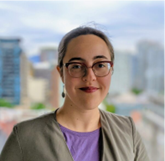
Melanie Demers is the Technical Lead of Indigenous and Stakeholder Information Management at Two Worlds Consulting (TWC). She is a Kanyen’kehá:ka member of Six Nations of the Grand River and is Québecois. At TWC, Mel works on reconciliation planning projects, impact assessments, and interdisciplinary research studies with Indigenous Nations. She is a former instructor of Indigenous Astronomy at Six Nations Polytechnic, and also has a MSc in Astrophysics (she worked with McMaster’s Dr Laura Parker on galaxy group research). Her diverse experiences as an author, facilitator, researcher, and consultant have strengthened her ability to present findings to many audiences, and perform qualitative and quantitative data analysis in many contexts. Mel is passionate about the application of Two-Eyed Seeing in her work with Indigenous Nations, and she values community, collaboration, and lifelong learning.
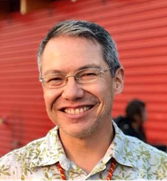
Corey Gray is Scottish & Blackfoot and a member of the Siksika Nation of Alberta, Canada. He grew up in southern California and received Bachelor of Science degrees in Physics and Applied Mathematics from Cal Poly Humboldt. After undergrad, he was hired by Caltech to work for the astronomy project, LIGO (Laser Interferometer Gravitational wave Observatory) at the LIGO Hanford Observatory in Washington State. At LIGO, Corey has worked on teams to both build and operate gravitational wave detectors since 1998. The LIGO Scientific Collaboration (LSC) made historic news in 2016 by announcing the FIRST direct detection of gravitational waves, which helped prove a prediction made 100 years earlier by Albert Einstein! This also garnered the founders of LIGO the Nobel Prize in Physics for 2017. The LIGO, Virgo, & KAGRA collaborations are currently up to a total of 90 gravitational wave detections! Corey enjoys & appreciates the importance of science communication. Over the years he has given keynotes, plenary talks, public colloquia and a TEDx talk. He especially loves to share the science of Einstein with Indigenous youth and other underrepresented groups. Corey is currently serving as a juror for the National Academy of Science’s “Awards for Excellence in Science Communication”. Corey is proud to be Indigenous. He recruited Sharon Yellowfly (his mom) to translate LIGO scientific documents into the Blackfoot language. In his free time, Corey likes to backpack, travel, salsa dance, crosscountry ski, go to pow wows, share science with the public, and kayak (with a wooden kayak he built).
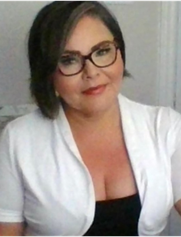
Vicki M. R. Monague
Aaniin/Boozhoo Giinawaa, Niin sa Mzhakdoo Kwe indaaw, ma’iingan nindoodem, Gichi-name-minissing indoonjibaa. Boodwewadami-Ojibwe Anishinaabe Kwe indaaw. Niso-niijaanisag gii-miinigooyaan. Bawaatiing miinawaa Godaanishiing indaa noongom. Mii go gegniin egikinoo’amaaged noongom. Mii go biijiinag gaa-ishkwaa-gikinoo’amaaganawiyaan iwedi Lakehead University-ing. Ingii-giizhiitanan Master of Education degree miinawaa Bachelor of Arts in Political Science. Mii sa go apane dibendaagoziyaan Nso-ishkodeng Midewigaaning. Ingichi-zaagitoon Anishinaabemowin, mii wenji-nokiitamaan apane. Nin-wiidookawaa Anishinaabe ji-nitaa-Ojibwemod. Ingichi-debweyendam a’aw Gizhemanido gaa-ozhibii’igaadeg gakina gegoo iwedi nakeyaa Anangokaaning. Gizhe-manidoo gii-miinigooyang gakina gegoo ji-minobimaadiziyang. Mii wenji-ganawenimangidwaa Aadisookaanag. Bangii eta go niwii-dazhimaag gegiinwaa ingiw manidook endaawaad waasa wedi Anangokaaning. Mii sa iw. Miigwech.
Hello Everyone, My name is Vicki Monague and I am Pottawatomi-Ojibwe Anishinaabe Kwe from Christian Island, of the wolf clan. First and foremost, the Creator gave me three beautiful children who call me Mom. I currently work as an Indigenous Studies and Ojibwe Language Instructor. Recently, I graduated from Lakehead University with a Master of Education degree, where I also completed a Bachelor of Arts in Political Science. My passion in life is the Ojibwe Language and Anishinaabe cultural worldview. The Creator wrote everything in the stars and I will share a little bit about our sacred Anishinaabe Celestial Sphere. Miigwech.

